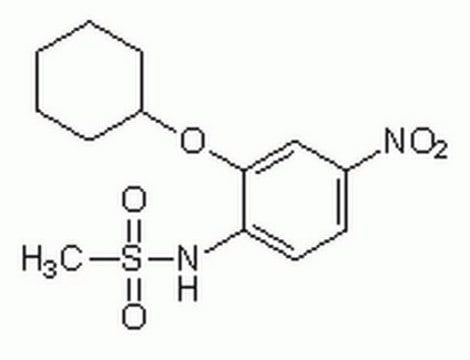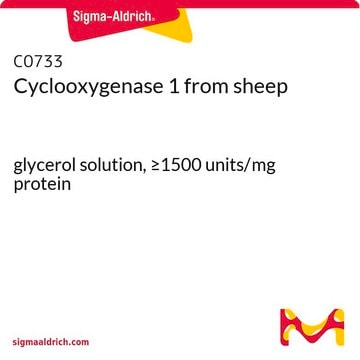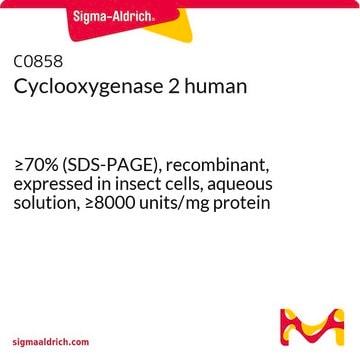N194
NS-398
≥98% (HPLC), solid
Synonym(s):
N-[2-(Cyclohexyloxy)-4-nitrophenyl]methanesulfonamide
About This Item
Recommended Products
Quality Level
Assay
≥98% (HPLC)
form
solid
color
off-white
mp
127-128 °C
solubility
DMSO: >5 mg/mL
H2O: insoluble
SMILES string
CS(=O)(=O)Nc1ccc(cc1OC2CCCCC2)[N+]([O-])=O
InChI
1S/C13H18N2O5S/c1-21(18,19)14-12-8-7-10(15(16)17)9-13(12)20-11-5-3-2-4-6-11/h7-9,11,14H,2-6H2,1H3
InChI key
KTDZCOWXCWUPEO-UHFFFAOYSA-N
Gene Information
human ... ALOX5(240) , CYP19A1(1588) , PTGS1(5742) , PTGS2(5743)
mouse ... Ptgs2(19225)
Application
- the cardiac rate in zebrafish embryos
- apoptosis and hypoxia/reoxygenation in rat cardiomyocytes
- the lipopolysaccharide (LPS) induced anorexia in rats
Biochem/physiol Actions
Storage Class Code
11 - Combustible Solids
WGK
WGK 3
Flash Point(F)
Not applicable
Flash Point(C)
Not applicable
Personal Protective Equipment
Certificates of Analysis (COA)
Search for Certificates of Analysis (COA) by entering the products Lot/Batch Number. Lot and Batch Numbers can be found on a product’s label following the words ‘Lot’ or ‘Batch’.
Already Own This Product?
Find documentation for the products that you have recently purchased in the Document Library.
Customers Also Viewed
Our team of scientists has experience in all areas of research including Life Science, Material Science, Chemical Synthesis, Chromatography, Analytical and many others.
Contact Technical Service














